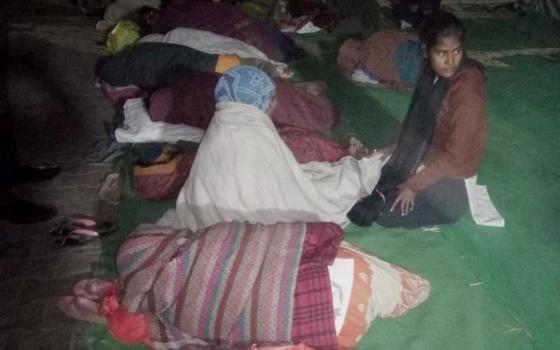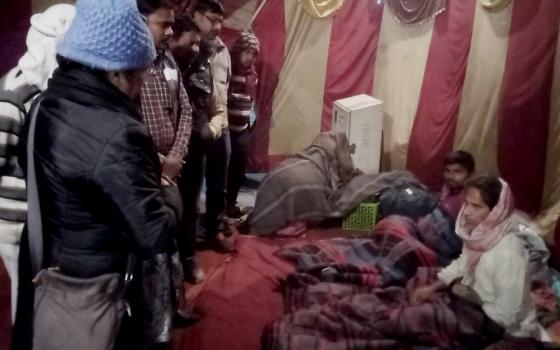Winter is always a very difficult time for all those who live on the margins; who are trying to make both ends meet; who are struggling to live a dignified life. When I work with homeless communities in India and experience how they are denied the basic amenities of life, it makes me wonder where the human race is going.
A deeply committed team of youth in Aashray Adhikar Abhiyan has been working to make life a little better for our communities. Though being out till midnight is a challenge for the young team, to enhance our commitment and dedication it is important to have a firsthand experience of how people grapple with life situations.
At 8 p.m. on Jan. 12, a team of 10 of us — two women and eight men — set out to visit the temporary shelters put up by the government for the homeless communities in Patna, Bihar. Since I have been appointed to a committee of the Supreme Court of India that addresses the urban homeless, I have an impetus and direction to move on this issue.
There are three permanent shelters and six temporary shelters in the city to give relief to those who sleep in the open air, on pavements and under overhead bridges. Though substandard, the shelters have — at least to a certain extent — provided them the shelter they need. The shelters are made of tarpaulin on four sides, and hay is used on the ground to keep the place warm. Blankets are provided for the residents, who spend the night and return the blankets in the morning.
Each shelter has a caretaker with an eight-hour rotation duty; food is made available at a nominal cost in the mornings and at night. It is important that food is available because most of the people who come to the shelters work as daily wage earners.
We took away enriching impressions from listening to the young people share their experience of our visit. They had interacted extensively with the residents of the shelter, becoming familiar with their problems.
One of the sights that disturbed us was a fairly young woman who was living with six children out in the open, under a bridge. Adjacent to the place where they were sleeping was a shelter that was empty, and yet the police were not willing to let them use it.
We were well-dressed for the cold, but the six children were running around at 11:30 p.m. with little or nothing to cover their bare bodies. It made me wonder: How do so many of our people who live on the periphery survive in these conditions?
I was reminded of the saying of Jesus: "Consider the lilies of the field, how they grow. They don't toil, neither do they spin because even the birds are provided for by God."
Somehow, the poor live this to their core; their trust and dependency in the providence of God is amazing. They are contented with the little they have. Those little children were running around in the cold as if it were broad daylight, and laughter filled the air. Those insignificant children, who didn't have a worry in the world, taught us a lesson.
These images keep coming to my mind time and again, and fill me with gratitude to the Almighty that I have a roof over my head, a warm, cozy bed and everything I need to keep the cold away; there are so many people who are denied this and I need to work to make their life a little better.
In another shelter, we found a number of people who had come from different districts of Bihar for health services. A young Muslim man from Mumbai with three daughters was forced to give up his job because he had heart-related problems. He has been knocking at different doors for some help, yet no one has been able to reach out to him. When he is badly in need of medication, he goes to a nearby mosque and gets money for his medicines.
We have taken up this issue and are trying to approach the member of the Legislative Assembly or the member of Parliament to provide him with some relief from their fund for his treatment.
In yet another shelter, we found a large number of laborers who work on construction sites during the day and come to the shelter at night, with their few belongings in a bundle. Earlier, they had been living beside the railway line, but since their huts were demolished, they have to move every day to work and rest at night. Very tough indeed after a day's hard work! They trudge back to the shelter just to lay their tired bodies down to rest.
The next morning, they rise again at 3:30 to go to the sites, hoping that someone will employ them for the day. What a struggle, what an anxiety — they are not even sure that they will get work for the day. And this cycle goes on: Nothing gets better but they live in hope that someday they will get work.
Each of us at that discussion was filled with gratitude for what we have. We may not have huge palaces, but we each have a home to go to, a roof over our heads. What we witnessed and the stories we heard from the mouths of the homeless people will stay with us for a long time.
On deeper reflection — as one of our empowered women once said — "Didi [big sister], whose land is this? God has sent us into this world, so all the land belongs to all of us. ... Then why is it that some of us are landless? Then why is it that some have more and some of us don't even have a bit to cover our heads?"
What a profound theological reflection! These are questions that continue to haunt us as we grapple with the question: "After all, whose land is this?"
Today, land is available for everything: for overhead bridges, for widening of roads, to beautify the city with parks, for convention halls, malls and the like — all for one segment of society. But when it comes to procuring land to build houses for the poor, "it's not available ... it's prime land ... we need the land for development."
But what kind of development do we have when we fail to give people a dignified life, especially when we reflect on Goal 11 of the sustainable development goals — sustainable cities and communities? Governments need to put policies in place to ensure that this becomes a reality.
We pray that our small efforts and small initiatives will bring results for those who live on the periphery.
[Dorothy Fernandes is a Sister of the Presentation of the Blessed Virgin Mary from India. She currently serves as vice provincial of the Indian province while continuing to be deeply engaged with the urban poor of Patna, Bihar.]


